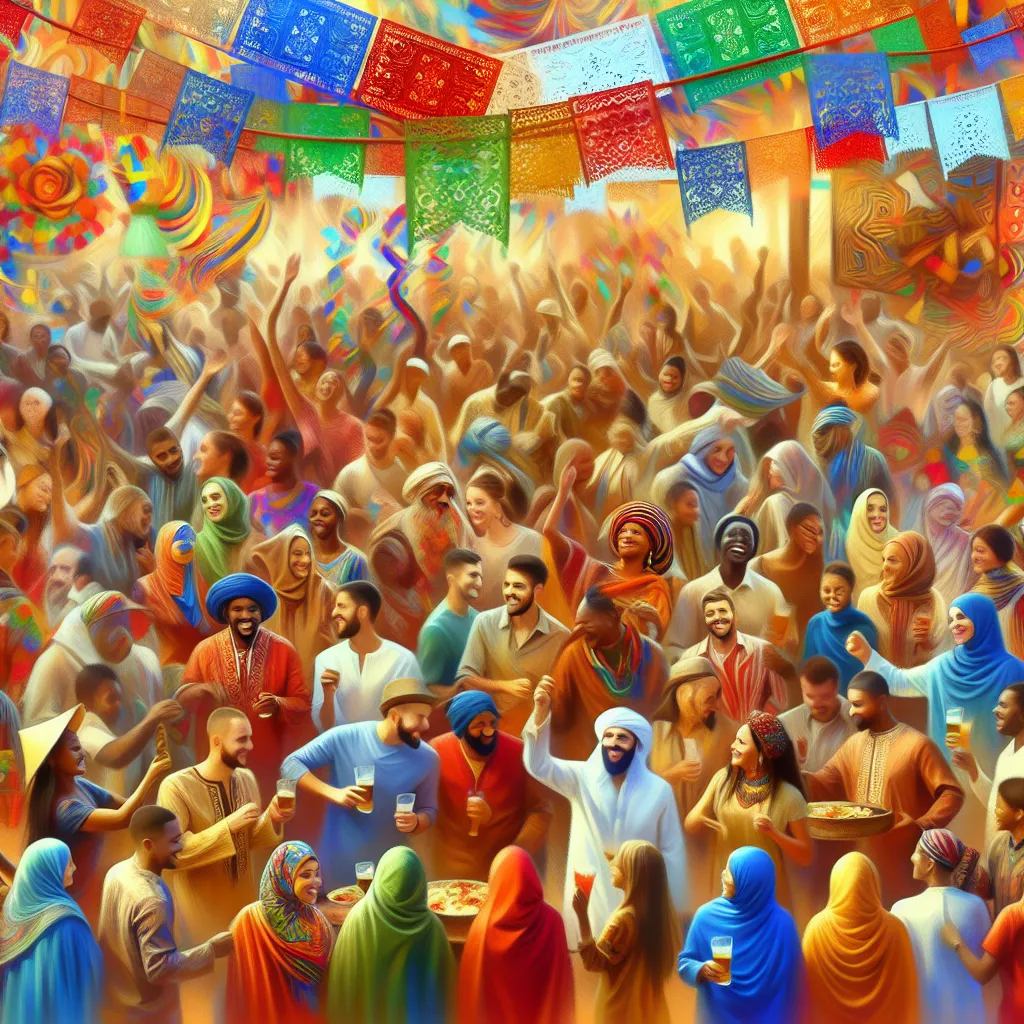Cultural traditions form an integral part of our identities and societies. In IELTS Speaking, you may be asked to describe a cultural tradition you enjoy in your country. This topic is quite common and has appeared in various forms in past IELTS exams. Being well-prepared to discuss cultural traditions can significantly boost your speaking score.
Nội dung bài viết
 Cultural tradition celebration
Cultural tradition celebration
Part 1: Introduction and Interview
In Part 1, the examiner may ask you some general questions about cultural traditions. Here are a few examples:
- Do you enjoy participating in cultural traditions?
- What’s your favorite cultural tradition in your country?
- How often do you take part in cultural events?
Let’s look at a sample answer for the second question:
Sample Answer (Band 7-8):
“My favorite cultural tradition in Vietnam is definitely Tet, our Lunar New Year celebration. It’s a time-honored custom that brings families together and allows us to pay respects to our ancestors. What I particularly enjoy about Tet is the festive atmosphere that permeates the entire country. Streets are adorned with colorful decorations, and homes are filled with the aroma of traditional foods. It’s a joyous occasion that I look forward to every year.”
Part 2: Long Turn
For Part 2, you might receive a cue card like this:
Describe a cultural tradition in your country that you enjoy.
You should say:
- What the tradition is
- When and how it is celebrated
- Who participates in it
- And explain why you enjoy this tradition
Here’s a sample answer targeting Band 8-9:
“I’d like to talk about a cultural tradition in Vietnam that I thoroughly enjoy – the Mid-Autumn Festival, also known as Tet Trung Thu. This centuries-old celebration takes place on the 15th day of the eighth lunar month, usually falling in September or October in the Western calendar.
The festival is primarily a children’s holiday, but it’s truly a family-oriented event. People celebrate by gathering with loved ones, enjoying mooncakes and other seasonal treats, and participating in various activities. One of the most iconic aspects of the festival is the lantern processions, where children parade through streets carrying colorful lanterns of different shapes and sizes.
What makes this tradition particularly special is its rich symbolism. The round shape of mooncakes represents unity and completeness, while the bright lanterns symbolize hope and light. It’s a time when families come together to appreciate the harvest moon, which is believed to be at its fullest and brightest during this period.
I find immense joy in this tradition for several reasons. Firstly, it evokes nostalgia from my childhood, reminding me of the excitement I felt as a young boy participating in lantern parades. Secondly, it serves as a perfect opportunity to reconnect with family and friends, fostering a sense of community and togetherness. Lastly, I appreciate how this tradition helps preserve our cultural heritage, passing down age-old customs and values to younger generations.
The Mid-Autumn Festival, with its blend of mythology, gastronomy, and community spirit, truly captures the essence of Vietnamese culture. It’s a tradition that not only brings joy but also helps maintain our cultural identity in an increasingly globalized world.”
Follow-up Questions
The examiner might ask additional questions such as:
- Has this tradition changed over time?
- Do you think young people are less interested in cultural traditions nowadays?
Sample Answer (Band 8-9):
“While the core elements of the Mid-Autumn Festival remain intact, there have been some noticeable changes over the years. In recent times, we’ve seen a shift towards more commercialization, with mass-produced mooncakes and lanterns becoming increasingly common. However, there’s also been a resurgence of interest in traditional handmade items, as people seek to reconnect with the festival’s roots.
Regarding young people’s interest, it’s a complex issue. On one hand, globalization and technology have exposed younger generations to a wide array of entertainment options, potentially drawing attention away from traditional celebrations. However, I’ve observed a growing trend among young Vietnamese to rediscover and reimagine their cultural heritage. Many are finding creative ways to blend traditional elements with modern interpretations, keeping the spirit of the festival alive while making it relevant to contemporary life.”
Part 3: Two-way Discussion
In Part 3, the examiner might ask more abstract questions related to cultural traditions. Here are some examples:
- How do cultural traditions contribute to a country’s identity?
- Do you think globalization is a threat to cultural traditions?
- What role should governments play in preserving cultural heritage?
Let’s look at a sample answer for the first question:
Sample Answer (Band 8-9):
“Cultural traditions play a pivotal role in shaping a country’s identity. They serve as a tangible link to our past, helping us understand our roots and the values that have shaped our society over generations. These traditions often encapsulate the collective wisdom of a culture, reflecting its unique worldview and way of life.
Moreover, cultural traditions act as a unifying force within a society. They provide shared experiences and rituals that bring people together, fostering a sense of belonging and community. This shared cultural identity can be particularly important in multicultural societies, where it can help maintain social cohesion while celebrating diversity.
Furthermore, cultural traditions often contribute to a country’s soft power on the global stage. They can become a source of national pride and a way to distinguish a country in the international arena. We see this in how countries often showcase their traditional arts, crafts, and festivals to attract tourists and promote cultural diplomacy.
However, it’s important to note that cultural identity is not static. As societies evolve, so do their traditions. The key lies in striking a balance between preserving the essence of these traditions and allowing them to adapt to changing times. This dynamic nature of cultural traditions ensures they remain relevant and continue to contribute meaningfully to a country’s evolving identity.”
Key Vocabulary and Phrases
To score high in IELTS Speaking, it’s crucial to use a range of sophisticated vocabulary and phrases. Here are some examples from the sample answers above:
-
Time-honored custom (adjective + noun): A tradition that has existed for a long time and is respected.
Example: Drinking tea is a time-honored custom in many Asian countries. -
Festive atmosphere (adjective + noun): A joyful and celebratory mood.
Example: The festive atmosphere during Christmas makes even the cold weather enjoyable. -
Centuries-old celebration (adjective + noun): An event that has been celebrated for hundreds of years.
Example: The Running of the Bulls is a centuries-old celebration in Pamplona, Spain. -
Evoke nostalgia (verb + noun): To bring back memories of the past.
Example: The smell of freshly baked bread often evokes nostalgia for my childhood. -
Preserve cultural heritage (verb + noun phrase): To maintain and protect traditional culture.
Example: Many museums work to preserve cultural heritage through their exhibitions and educational programs. -
Shift towards commercialization (noun + preposition + noun): A change in the direction of making something more focused on making money.
Example: There’s been a noticeable shift towards commercialization in many traditional festivals. -
Resurgence of interest (noun + preposition + noun): A renewed increase in interest.
Example: We’re seeing a resurgence of interest in traditional crafts among young people. -
Pivotal role (adjective + noun): A very important or essential role.
Example: Education plays a pivotal role in shaping a person’s future. -
Encapsulate the collective wisdom (verb + noun phrase): To summarize or capture the combined knowledge and experience of a group.
Example: Ancient proverbs often encapsulate the collective wisdom of a culture. -
Soft power (adjective + noun): The ability to influence others through cultural or economic means rather than military force.
Example: K-pop music has become a significant source of soft power for South Korea.
Tips from an IELTS Speaking Examiner
As an experienced IELTS examiner, I would offer the following advice to achieve a high score in the Speaking test:
-
Practice regularly: Consistency is key. Try to speak English every day, even if it’s just for a few minutes.
-
Expand your vocabulary: Learn new words and phrases related to common IELTS topics, including cultural traditions.
-
Use idiomatic expressions: Incorporate natural-sounding idioms and collocations into your speech.
-
Develop your ideas: Don’t just give short answers. Explain your thoughts in detail and provide examples.
-
Work on your pronunciation: Clear pronunciation is crucial. Pay attention to word stress and intonation.
-
Stay up-to-date: Keep informed about current affairs and global issues to handle a variety of topics confidently.
-
Record yourself: This can help you identify areas for improvement in your speaking skills.
-
Seek feedback: If possible, practice with native speakers or English teachers who can provide constructive criticism.
Remember, describing cultural traditions effectively requires not just language skills, but also a deep understanding and appreciation of your own culture. By combining these elements, you’ll be well-prepared to tackle this topic in your IELTS Speaking test.
For more practice on describing experiences and places, you might find these resources helpful:
- Describe a meal that you enjoyed at a restaurant recently
- Describe a time when you attended a cultural festival
- Describe a place where you would like to go on holiday
By mastering the art of describing cultural traditions, you’ll not only improve your IELTS score but also gain a deeper appreciation for the rich tapestry of global cultures.


